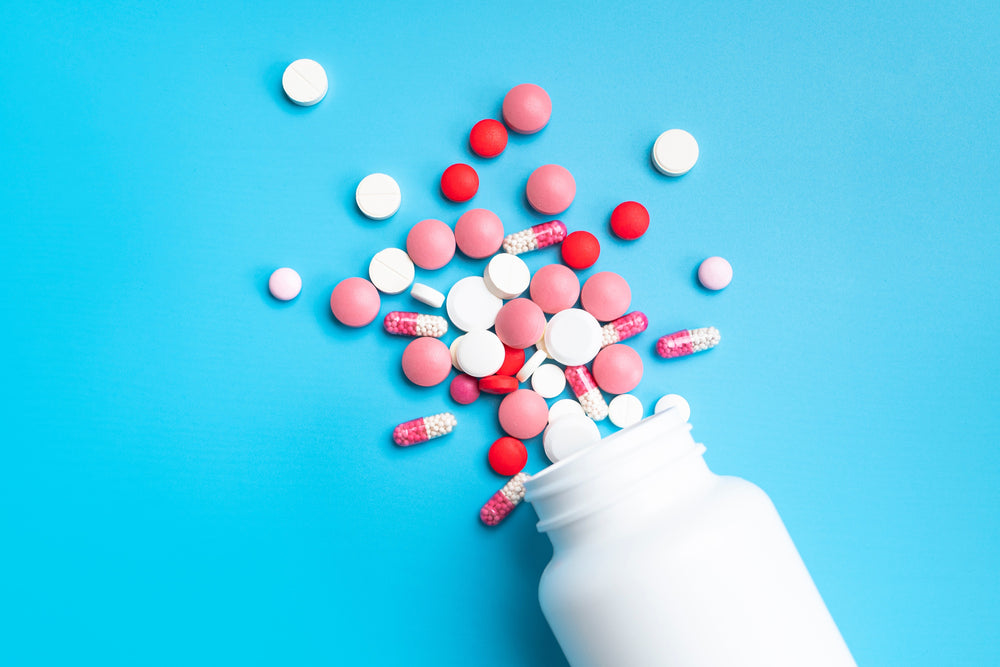Vitamins are essential for people and pets to ensure proper organ function and overall health and wellness. It's not uncommon for human doctors to advise their patients to take a vitamin D supplement, especially during the winter months when they receive less sun exposure.
Although pets and people have similar vitamin requirements, ingesting vitamin D supplements can lead to vitamin D toxicosis in dogs, which is life-threatening. Vitamin D is present in various sources, so dog owners must understand how toxicity occurs and what to do if their pup accidentally ingests this potentially deadly vitamin.

What is Vitamin D?
Vitamin D is a fat-soluble vitamin that supports the proper functioning of a dog's bones, nervous system, and immune system. Additionally, vitamin D is required to properly absorb calcium and phosphorus from the kidneys, bones, and gastrointestinal tract.
Vitamin D comes in two forms: D2 and D3. Ergocalciferol, or vitamin D2, is present in various plants and fungi. Cholecalciferol, or vitamin D3, is produced in animals and is more commonly included in supplements and other commercial sources of vitamin D.
How Does Vitamin D Poisoning Occur in Dogs?
Although vitamin D is essential for proper bodily functions, excess vitamin D can disrupt the body's balance and absorption of calcium and phosphorus. Cholecalciferol (D3) is metabolized first in the liver, then broken down, and further metabolized in the kidneys. This metabolized form of vitamin D is responsible for the body's absorption of calcium and phosphorus.
When excess amounts are present, it results in high calcium levels (hypercalcemia) and high phosphorus levels (hyperphosphatemia), which can lead to tissue mineralization. Dogs who ingest too much vitamin D are at risk for a variety of health issues, including acute kidney failure, which is fatal without treatment.
Common sources of vitamin D poisoning in dogs include:
- Human vitamin D supplements
- Cholecalciferol rodenticides
- Psoriasis treatment cream (dogs can be poisoned after licking their owners who have used the cream)
- Imbalanced pet foods, including homemade diets
- Plants including, day blooming jasmine (Cestrum diurnum), yellow oat grass (Trisetum flavescens), and waxyleaf nightshade (Solanum malacoxylon)
Signs of Vitamin D Toxicity in Dogs
Toxicity signs are variable depending on the amount of vitamin D ingested, underlying health issues, like kidney disease, and a dog's weight. For some dogs, 1 mg of vitamin D is a toxic dose. Following ingestion, toxicity signs may take more than 24 hours to be evident, so it's critical to seek immediate emergency veterinary care if you suspect your dog has ingested any vitamin D.
Clinical signs of vitamin D poisoning may include:
- Vomiting
- Diarrhea, which may contain blood
- Abdominal pain
- Decreased appetite
- Lethargy
- Increased breathing rate
- Difficulty breathing
- Increased thirst and urination
- Excessive drooling
- Weight loss
- Abnormal heart rate and rhythm
How is Vitamin D Toxicity Diagnosed and Treated?
A vitamin D toxicity diagnosis is based on a history of vitamin D ingestion, symptoms of vitamin D toxicity, and blood work. If you have observed your dog accidentally eating your supplements or licking psoriasis cream, ensure to bring the bottle to your emergency veterinarian so that they can determine the amount ingested. If ingestion has occurred recently, your veterinarian will likely induce vomiting to begin decontamination of the body. Regular monitoring will be required because it can take time for clinical effects and blood changes.
Affected dogs may have elevated blood calcium and phosphorus and abnormal renal values. A urine test may also be recommended to monitor kidney function and health.
Other treatments may include:
- Activated charcoal to help prevent further vitamin D absorption
- Oxygen therapy
- Intravenous (IV) fluid therapy
- Gastrointestinal support medications, like antacids
- Antinausea medication
- Steroid medication (e.g., prednisone) to help with excretion of calcium and decrease vitamin D absorption
- Diuretic medication (e.g., furosemide)
- Phosphate binders
- Low calcium diet
Dogs who receive immediate treatment have a more favorable prognosis. Vitamin D poisoning is deadly, and treatment should not be delayed. For more severe cases, an extended hospital stay will be required. Additionally, during the following weeks, most affected dogs will need several veterinary checkups to monitor blood values, including kidney, liver, and electrolyte levels. Some dogs may also experience lifelong kidney damage.
How to Prevent Vitamin D Toxicity in Dogs
Vitamin D poisoning is severe and potentially deadly to dogs who do not receive prompt veterinary care. Accidents can happen anytime, so ensuring you are prepared will give your pup the best chance of recovering.
If you suspect your dog has ingested excess vitamin D, immediately call the ASPCA Animal Poison Control or the Pet Poison hotline or seek veterinary emergency care. In most cases, your dog must be admitted to the closest emergency veterinary hospital.
Tips to prevent a toxic ingestion include:
- Dog-proof the home and keep all vitamins and medications out of paws' reach.
- Consult your DVM before giving your dog any supplements.
- Avoid using any rodenticides where pets are present.
- Feed your dog an AAFCO-approved complete and balanced diet.
- Regularly check the AVMA pet food recall list to ensure the safety of your dog food.
- If you and your veterinarian suspect your dog's diet is the source of vitamin D poisoning, contact the FDA.
Always consult your veterinarian before giving your pup any vitamins or supplements. Although vitamin D is essential for proper health, too much of a good thing can be deadly or have life-long consequences. Feeding your dog a complete and balanced diet will ensure it has the required vitamins, minerals, and nutrients to thrive.
For more information and tips on your dog's health, check out the Native Pet blog.


